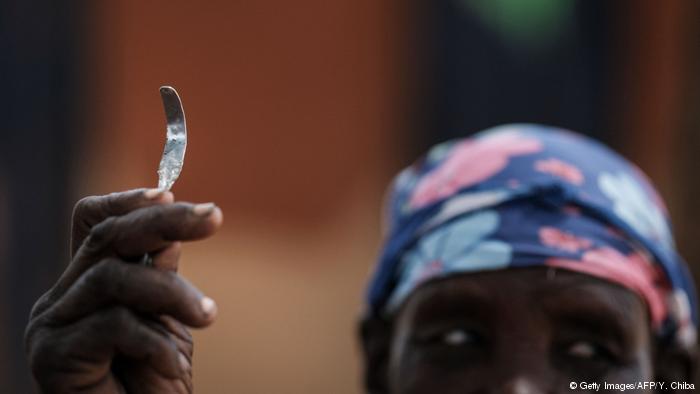Everyone is welcome at Berlin’s Ibn Rushd-Goethe Mosque
 Can Muslim women and men pray together as equals? In Berlin, a liberal mosque housed in a Protestant church just opened. Many people are pleased, but not everyone. DW’s Sabine Kinkartz reports.
Can Muslim women and men pray together as equals? In Berlin, a liberal mosque housed in a Protestant church just opened. Many people are pleased, but not everyone. DW’s Sabine Kinkartz reports.
Seyran Ates, a feminist, lawyer, Sunni Muslim and imam-in-training, begins the day by expressing her gratitude. She thanks those who have helped her establish the Ibn Rushd-Goethe Mosque, and thereby supported her on her “long, moral and theological” path. She is grateful to everyone who reassured her that she was not inventing a new religion but instead, initiating long overdue reform.
She also thanks all those who will deliver the food for the communal evening meal when the Ramadan fast ends at sunset. “These are Turkish men supporting us,” exclaims Ates, while her guests applaud. “Many think, yeah, the weird activist and feminist has opened a mosque on her own – but that’s not how it is,” she says.
Liberalization overdue
“Here, women and men will pray together, and women will be able to lead the prayer and preach,” says Ates. By making this possible, Ates has initiated a sort of reform comparable to changes underwent by the Christian and Jewish faiths.

Seyran Ates, founder of the new liberal Ibn-Rushd-Goethe-Mosque, prays at its opening in Berlin
“Christian and Jewish women had to go through so much, and now we’re going through it, too,” she says. But Ates goes a step further in her liberal mosque. Gay men and women are explicitly welcome. “It is also important that we are together under the roof of our prayer room, with various denominations like Sunnis, Shiites, Alevis and Sufis.”
Guests from all over Europe and the United States came to Berlin for the mosque’s opening. Among them was the Muslim human rights activist Saida Keller-Messahli, a Swiss woman of Tunisian descent.
“This idea has been important for a long time, but many do not trust themselves to prioritize it,” she says. Keller-Messahli explains that instead of the reformation and liberalization of Islam, fundamentalist re-Islamization can be observed worldwide. She also noted that traditional mosque associations in Germany still do not take measures against the radicalization of community members.
Many are scared
“We have to do something about the radical followers. If we remain silent, nothing changes,” says Ates. But that is not easy. It took eight years to make the idea of a liberal mosque a reality. “We first had to find people who had the courage to do it,” she says.
Some also backed out after they had committed. “They said, ‘There will be too much blowback’ or ‘it will be dangerous,’ or ‘I am afraid,'” explains Ates. The 54-year-old can understand this. She has seen how dangerous it can be if you try to shake up Islamic traditions and taboos. As a lawyer, she has spent years fighting against domestic violence, honor killings and forced marriages.

The mosque is located on the third floor of St. John’s Church near Berlin’s Tiergarten
But her dream has come true. For eight years, Ates has been working on making her idea become a reality. However, the parish of Berlin’s St. Johannis church has also admitted to its fears. “When we were asked whether we could accommodate the mosque, help it get off the ground and provide hospitality, we had a serious and controversial debate,” recalls Sabina Röhm, the pastor, who says a lot had to be done to persuade the parish council, as well.
The opening of the mosque is not the end of the story; it is only the beginning. “We will have to enter into a dialogue in order to overcome fears and unfamiliarity and get to know each other,” says Röhm. “Ates, her community members and we are fiercely determined to do that, and are looking forward to it.”
Who guarantees security?
This does not apply to all community members and local residents. On the opening day of the mosque, a few people were handing out flyers because they feel that Islam does not belong in Germany. Parents of children at the church community’s daycare center are concerned that the mosque may attract extremists. “What would you do if a terrorist storms across the premises?” asks a father whose child attends the daycare. “Do you have a security concept at all? And what does it entail?”
At the moment, the management of the church community comes across as a bit helpless. “We have held extensive talks with various security authorities and have received the information that there is no known danger that would compromise a leasing agreement,” explains Magdalena Stachura, the head of St Johannis parish. “These are professionals, and when they say this it is, at least for us, a good and comforting message.”
Of course, everyone has to “keep their eyes open,” she says, adding that no one can see into the future.

Eight years after starting the journey, Ates has fulfilled a dream
The right to keep on living
Seyran Ates has also remained in contact with the police and the state office of criminal investigation. “We will do everything in our power to guarantee the highest level of security,” she explains.
Ates says the management running the mosque is not taking any risks.
“We will tailor our security approach to our experiences over the next weeks and months,” she says, adding that so far there have been no threats. But Ates knows from bitter experience how quickly this can change. She has been threatened more than once in her life.
In the future she also does not want to continually avoid confrontations with conservative Muslims. She considers herself a democrat and says that democracy offers everyone the chance to live with their faith.
“I don’t have a problem with traditional or conservative Muslims, as long as they are in line with human rights,” Ates says. “And these men and woman should stop trying to take away my right to be a Muslim and my right to want to keep on living.”
Author: Sabine Kinkartz
_____
WTO RECOMMENDS
“Talent has no boundaries”
Women have always featured in the news, at times as commodities, sometimes as art. But it is still rare for an immigrant woman to become the talk of the town for her entrepreneurial debut and leadership skills. (From May 16, 2017)
Inspirational women in science
Many women have provided a rich source of inspiration for young scientists – both male and female – down the years. They’ve made remarkable discoveries, often despite ingrained sexism within their chosen field. (From March 28, 2017)
Changing education landscape of Pakistan
Seema Azis is one of the most prominent business leaders in South Asia. However, she is mostly known for her work in improving the education sector of Pakistan. Aziz runs more than 700 English medium schools in Pakistan for the underprivileged. (From March 8, 2017)






